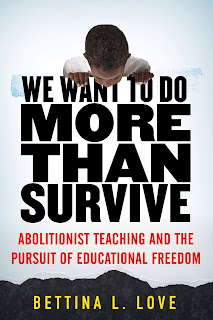Abolitionist Teaching
This book rocked me to my core. This book told me everything that I've been needing to hear about being an educator right now as well as some things that I didn't know that I needed to hear.
I've frequently felt the urgency of the importance of fighting for equity for my students this year. With the #blacklivesmatter movement, the deaths of George Floyd and Breonna Taylor, and many of the protests surrounding police brutality, I see now more than ever that my students need me to acknowledge the systemic racism, sexism, homophobia, transphobia, and poverty that perpetually makes it difficult for my students to learn.
Bettina L. Love is a professor at the University of Georgia. In this professional development book, We Want to Do More Than Survive: Abolitionist Teaching and the Pursuit of Freedom, she talks about her experiences being raised in a Black community, the people who supported her in going to college, and what that has meant for her life. She uses poignant examples from her childhood as well as from her own teaching experience to highlight the need for abolitionist teachers.Race affects so many aspects of our lives because of privilege and systemic racism. This includes education. I love that this book also emphasizes intersectionality. Many of my students are not only of minority race but also are members of the LGBTQ community. We cannot simply say that our lives are only affected by one small aspect of our identity but we are constantly affected by all aspects of our identity simultaneously. I cannot divorce the fact that I am white from the fact that I am a woman nor that I'm straight. Neither can my students.
Bettina Love, the author of this profoundly interesting book, spends much of the time tracing the history of the "Educational Survival Complex" and the inability of the current system to serve the needs of students of color and other social minorities. She calls for a destruction of the current system and a rebuilding rather than a reformation of the current system. She calls for action rather than just talk from educators. "Antiracist teaching is not just about acknowledging that racism exists but about consciously committing to the struggle of fighting for racial justice, and it is fundamental to abolitionist teaching."
She highlights actions taken by the civil rights movement and many abolitionists and activists who have enacted real change. She urges educators to learn from their examples. "Abolitionist teaching is teachers taking back their schools, classroom by classroom, student by student, parent by parent, and school community by school community."
Lastly, I love her call for empowering students through civic education rather than teaching them things like "grit" which can only carry students so far when faced with systemic racism. She points out that "there is a civic empowerment gap because the rich have all the political influence and civics education is no longer a space that teaches youth how to petition, protest, speak in public, solve social issues with groups of people from diverse backgrounds, and commit to acts of civil disobedience."
If you are looking to up your game as an anti-racist, abolitionist teacher in this world that so desperately needs white allies to use their privilege as leverage in the fight for student's educational equity, then this is your book.



Comments